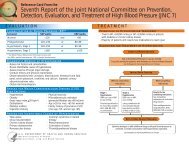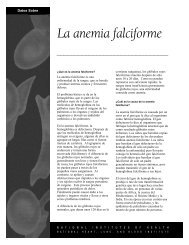WOMEN 'S HEALTH AND MENOPAUSE : - National Heart, Lung ...
WOMEN 'S HEALTH AND MENOPAUSE : - National Heart, Lung ...
WOMEN 'S HEALTH AND MENOPAUSE : - National Heart, Lung ...
You also want an ePaper? Increase the reach of your titles
YUMPU automatically turns print PDFs into web optimized ePapers that Google loves.
1. INTRODUCTION<br />
Menopause is associated with sharp declines in<br />
concentrations of circulating estrogen and other<br />
alterations in the hormonal milieu. 1 The hormonal<br />
changes affect a variety of reproductive and nonreproductive<br />
tissues, including the CNS eye; HRT<br />
with estrogen or other sex steroids may influence<br />
brain and eye functions (table 12–1). 2<br />
In the brain and eye, 3,4 as in<br />
other target organ systems,<br />
estrogen interacts with specific<br />
intranuclear receptors to<br />
regulate protein synthesis.<br />
Within the CNS system, individual<br />
neurons can express ERα, the ERβ, neither<br />
receptor, or occasionally both receptor types. (See<br />
ch. 5.) 3 Androgen and PRs are found in populations<br />
of neurons. Within the brain, some estrogen<br />
actions occur within a matter of seconds or minutes,<br />
too rapidly to involve genomic activation.<br />
Those rapid estrogen effects are believed to<br />
involve receptors located in the cell membrane. 5<br />
Limited data suggest<br />
a beneficial effect of<br />
estrogen on mood.<br />
Finally, estrogen can influence brain and eye functions<br />
indirectly, through effects on nonneural and<br />
nonocular tissues, including the vasculature and<br />
the immune system.<br />
Despite a strong biologic rationale, there is no<br />
strong evidence based on consistent findings from<br />
well-designed RCTs, controlled trials regarding the<br />
clinical importance of HRT for the central nervous<br />
system and the eye. Relevant preclinical and clinical<br />
data are beginning to emerge for several disorders.<br />
In some areas, a developing consensus may<br />
help guide clinical decisions on prevention and<br />
treatment.<br />
Age-associated cognitive decline is considered in<br />
this chapter, as are dementia, stroke, epilepsy,<br />
migraine, multiple sclerosis, Parkinson’s disease,<br />
and sleep disorders. With regard to mental health,<br />
there are data on mood and schizophrenia. Eye disorders<br />
of interest include age-related maculopathy,<br />
cataract, and dry eye.<br />
252<br />
2. AGE-ASSOCIATED COGNITIVE<br />
DECLINE <strong>AND</strong> NEUROLOGIC DISORDERS<br />
Clinical data exist for age-associated cognitive<br />
decline in healthy women and for a number of<br />
neurologic conditions. Some topics have been<br />
reviewed. 6<br />
2.1 Age-Associated Cognitive Decline<br />
Memory and other cognitive abilities change over<br />
time during adult life. Changes that represent usual<br />
or normal accompaniments of aging are not viewed<br />
as pathologic. Modest cognitive decrements initially<br />
detectable in middle age are accentuated at elderly<br />
age. In general, cognitive tasks that depend on<br />
previously learned knowledge are more resistant<br />
to decline than tasks involving new information<br />
or requiring the manipulation of old information.<br />
2.1.1 Effects of Estrogen<br />
Considerable data indicate that sex hormones<br />
measurably influence brain functioning throughout<br />
life. Higher cognitive scores in childhood are<br />
associated with a later age at menopause. 7 There<br />
is little evidence that menopause per se initiates<br />
cognitive deterioration.<br />
As inferred from in vitro and animal studies,<br />
estrogen has the potential to modulate cognitive<br />
processes. 6 Within the brain, estrogen affects a<br />
number of neurotransmitter systems, including<br />
cholinergic, noradrenergic, serotoninergic, and<br />
dopaminergic pathways, 6 which are involved in<br />
aspects of memory and attention. In ovariectomized<br />
rodents, estrogen improves memory<br />
performance on a variety of behavioral tasks. 8–10<br />
Estrogen interacts with NGF and other neurotrophins,<br />
11 promotes the growth of nerve<br />
processes, 12,13 and enhances synaptic plasticity. 14<br />
Estrogen protects neurons from a variety of<br />
endogenous and exogenous insults. 15,16 In animal<br />
studies, estrogen augments glucose transport into<br />
the brain and increases cerebral metabolism. 17,18<br />
In human studies, estrogen influences the pattern<br />
of brain activation during the performance of cog-
















